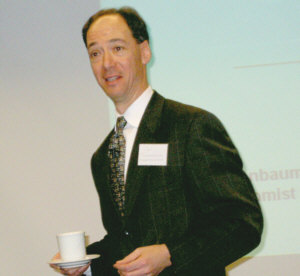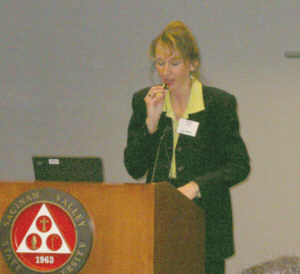Standard Federal Economist Sees Hope Amid Worries in 2005
Tannenbaum's Coffee Cup Humor Captivates Eager Tri-County Audience
February 2, 2005
By: Dave Rogers

Carl Tannenbaum balances a coffee cup as he tosses out one-liners to explain his "Rodney Dangerfield" theory of the U.S. economy.

Deb. Lutz, financial officer of Delta College, welcomes members and guests to the monthly meeting of the Tri-County Economics Club at Saginaw Valley State University.
Rail-thin, puckish economist Carl Tannenbaum of Standard Federal Bank explains the Rodney Dangerfield theory of the U.S. economy -- it gets no respect, especially internationally.
"Balancing Our Books" was the title of Mr. Tannenbaum's opus before the Tri-County Economics Club on Monday, Jan. 30 at Saginaw Valley State University.
Balancing a coffee cup as he joked his way into the audience's attentions, Mr. Tannenbaum re-stated the theme: "Balancing the books will go a long way toward determining the direction of our economy," he said.
He ladled out the bad news gently, as if dribbling acid in what would otherwise be a tasty soup.
The economy is threatened by big budget deficits and high oil prices. Mr. Tannenbaum said "the government gets a big red X" and commented:
"The consequences of running a big deficit could hit us at any moment, but a lot of Republicans, especially Sen. John McCain, are embarrassed by this state of affairs and are determined to address it. There is sentiment in favor of fiscal discipline."
Everybody seemed to buy it and there were affirmative nods all around like bobble-heads at a sports trinket sales convention.
He wasalso skeptical of the Bush Administration's plan to privatize Social Security and said the agency's budget could be stabilized with minor adjustments and "could be solvent for 100 years or more."
"The focus should be on Medicare," said the economist, noting that Hillary Clinton's health care plan doesn't look so bad now as it was portrayed when first proposed eight years ago. "Somebody's got to push back medical costs and the way services are delivered," he argued. "The system needs to betorn down to the studs and rebuilt."
But things aren't as bad as they could be and there is hope for improvement in 2005, said the University of Chicago-educated seer, on the fast track from Chicago through Saginaw and on to points acrossthe globe. The Dutch-owned firm he represents is locally headquartered in Troy. He was introduced by Laura B. Yockey, first vice-president, of the Saginaw office.
On the one hand, said the speaker in typical economist fashion, jobs increased by 2.2 million last year; on the other hand, "a lot of this was propped up by tax cuts that can't go on forever."
Manufacturing jobs in this country have been declining for the past 60 years, Mr. Tannenbaum noted with a knowing nod to Michigan industrialists, and the output of U.S. factories is at an alltime low. "However, factories are more efficient and materials are all more expensive," he noted.
As he spoke, silver linings were evident in the economic clouds over his head. "We borrow and spend too much and save too little; many people are living at or beyond their means," he said.
The stock market is up, but not at the level of the 90s and "there is a well of concern," he said.
"Are we sitting on the edge of something not so pleasant? No!" Why? "A massive amount of wealth has been created over the past 20 years in the U.S. in stocks, business profits and home equity; and, people naturally deplete their savings in retirement, so consumers are not over-leveraged," said Mr. Tannenbaum. Smiles ran across the room of 100 or more of the area's business elite like ripples on a wind-blown pond.
Pre-tax household debt is only about 13 percent of disposable income, so not to worry, according to the Standard Federal official.
Predictions for 2005: GDP, 3.6 percent; Inflation (CPI) 2.1 percent; unemployment 5.2 percent; fed interest rate, 3.5 percent. Energy costs will moderate and job creation will continue, he forecast. An adequate replacement needs to be found for Fed Chairman Alan Greenspan, who together with former chief Paul Volcker controlled interest rates over the past two decades.
China: "Anybody who goes to Wal-Mart is guilty of adding to the problem." However, the trade deficit may narrow as China buys more cars including parts made in the U.S., he said.
Threats this year according to Mr. Tannenbaum: Consumer demand, geopolitics, unemployment; upside, wealth effects, job creation; outlook, good but keep your eye on the budget.###